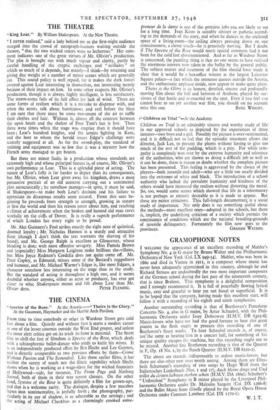GRAMOPHONE NOTES
I WELCOME the appearance of an excellent recording of Mahler's Symphony No. 4 in G major by Bruno Walter and the Philharmonic Orchestra of New York (Col. LX 949-54). Mahler, who was born in x86o and died in Vienna in 1911, is a composer whose music has never been adequately appreciated in this country, although he and Richard Strauss are undoubtedly the two most important composers of the German school during the last part of the nineteenth century, that is since Brahms. This symphony is a delightful composition and I strongly recommend it. It is full of peacefully flowing lyrical music, easy and graceful to hear yet not banal or superficial. It is to be hoped that the company, having made this excellent start, will follow it with a recording of his eighth and ninth symphonies.
Another outstanding recording is that of Beethoven's Pianoforte Concerto No. 4, also in G major, by Artur Schnabel, with the Phil- harmonia Orchestra under Issay Dobrowen (H.M.V. DB 6303-6). Music-lovers who have not had the good fortune to hear this great pianist in the flesh ought to procure this recording of one of Beethoven's finest works. To hear Schnabel records is, of course, not.the same as hearing him in a concert hall, for something of his unique quality escapes the machine, but this recording ought not to be missed. Another fine Beethoven recording is that of the Quartet in F, Op. a No. t, by the Busch Quartet (H.M.V. DB 6320-2).
The above are records indispensable to ardent music-lovers, but there are also other new ones worth noting. Among them are Eliza- beth Schumann's recording of two songs by Hugo Wolf from the Italienisches Liederbuch (Nos. x and i7), Auch kleine dinge and Und willst du dteinenliebsten sterben sehen (H.M.V. DA 186o); Schubert's " Unfinished " Symphony in B minor played by the Liverpool Phil- harmonic Orchestra under Dr. Malcolm Sargent (Col. DX 1266-8) and the Ballet Music from Giselle played by the Royal Opera House Orchestra under Constant Lambert (Col. DX 127o-I). W. J. T.


























 Previous page
Previous page